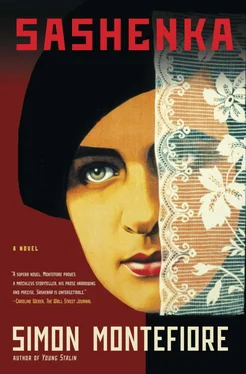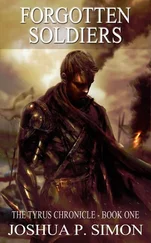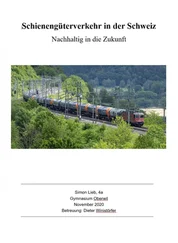“Studies? We’re much too busy for studies. I lied to you about my politics, Papa, because I had to. We Bolsheviks live by special rules. I was doing what was right.” Her face was firm, almost aggressive.
“It’s all right, Sashenka, I understand,” said Zeitlin, but he did not. He blamed himself for making his daughter into this godless avenger. She had lied to him and rejected the family. But he had taught her to disrespect faith and this was the result. And now was not the time for another quarrel. “Your mother thought you had a boyfriend.”
“How absurd! She hardly knows me. I have a job now at the Pravda newspaper as liaison with the Petrograd Committee and the Soviet.”
“But you must go back to school. The Revolution’s almost over, Sashenka. The government…”
“Papa, the Revolution’s just started. There are exploiters and exploited. No middle ground. This government’s just a temporary bourgeois stage in the march to Socialism. The peasants must have their land, the workers their equality. The soldiers now take their orders from the Soviet of Workers’ and Soldiers’ Deputies.” She was almost shouting at him now, flushed with defiance, her hands gripping his arms. “There’ll be one last stage of capitalist corruption and then all this rottenness, all the bloodsuckers—yes, even you, Papa—will be swept away. There’ll be blood on the streets. I love you, Papa, but we Bolsheviks don’t have families and my love counts for nothing in the face of history.”
Zeitlin had stopped trotting on his contraption. He looked at his daughter, at her exquisite freckles and dappled eyes, and was stunned.
Silence. From somewhere else in the house, there was a small pop.
“Did you hear that?” said Zeitlin, taking his cigar out of his mouth. “What was it?”
“It might have come from upstairs.”
Father and daughter went out into the hall and then, for some reason, they were running. Leonid was at the top of the stairs, Lala on the landing. All were looking at the door of Ariadna’s room. A cold hand clutched his heart, and Zeitlin rushed up the stairs.
“Ariadna!” he shouted, knocking on the door. The staff peered past him, goggle-eyed.
Ariadna was snowily naked on the divan. The smoking Mauser, dark and chunky, rested on her stomach. On her white skin, blood dripped crimson down her breast and pooled on the floor.
Sashenka stood at the window of the Gogol Street safe house, not far from the War Ministry, smoking a cigarette and peering out over the frozen Neva at the Peter and Paul Fortress. It was dark, yet the sky glowed an unnatural purple like a theatrical screen with a light behind it. The lantern atop the spire of the fortress’s church swung a little in the wind.
The workers controlled the fortress. Mendel and Trotsky had once been prisoners in the Trubetskoy Bastion but yesterday the prisoners had all been freed. It was early evening and the streets were still teeming as excited but good-natured crowds tore down any remaining Romanov eagles. The Okhrana headquarters was on fire.
Sashenka’s dreams were coming true but now she was numb. She walked the streets without seeing or hearing the remarkable sights. Her mother had pulled off the impossible: she had upstaged the Russian Revolution. People bumped into Sashenka. Someone embraced her. Vanya Palitsyn called her name from a careering car filled with Red Guards, a Romanov crest on its doors.
The apartment was too hot; she was sweating because she had not taken off her coat or hat. Why on earth had she walked straight here again? A place she had promised never to revisit. She had tried to block Sagan out of her mind; his time was past and probably he was already in Stockholm or the south. Yet here she was, in the familiar apartment, waiting for the person she was accustomed to confiding in about her mother.
She heard a sound and turned slowly. Captain Sagan, still in full gendarme uniform but haggard and bleary, stood there pointing a Walther pistol at her. Suddenly he looked his age, older even.
They said nothing for a moment. Then he put the pistol back in its holster and without a word came to her. They hugged. She was grateful he was there.
“I’ve got some brandy,” he said, “and the samovar’s just boiled.”
“How long have you been here?”
“I came last night. I didn’t know where else to come. Some workers went to my home and my wife has gone. The trains aren’t running. I didn’t know where to go so I just came here. Sashenka, I want to tell you something that will surprise you. My world—everything I cherished—has vanished in a night.”
“That’s not what you told me would happen.”
“I’m in your hands. You can turn me in. I was a believer in the Empire. And yet I told you the truth about myself.”
He took a bottle of Armenian brandy, cheap cha-cha , and poured out two shots, handing one to Sashenka. He downed his. She took off her coat and hat.
“Why are you here?” he asked. “I’d have thought you’d be celebrating.”
“I was. And then something terrible happened. I was going to the Taurida Palace but when I passed the guardhouse at the barracks I knocked on the door. It was open. The doorman—remember the doorman, Verezin?—was lying dead on the floor, shot in the head. And then I went into the Soviet and met my comrades.”
“You’d told them he was a traitor?”
She nodded.
“And you were surprised that he was dead?”
“No, I wasn’t surprised. A bit shocked, I suppose. But that’s revolution for you. When you chop wood, chips fly.”
“But you said something terrible had happened?”
“My mother shot herself.”
Sagan was aghast. “I’m so sorry, Sashenka. Is she dead?”
“No, she is just about alive. She shot herself in the chest. Apparently, beautiful women tend to avoid their faces. She found my Mauser, the Party’s Mauser, under my mattress. How did she know it was there? How could she have found it? The doctors are there now.” Sashenka paused, struggling to control her breathing. “I should have gone to the newspaper but instead I found myself here. Because it was here…with you…that we talked so much about her. I hated her. I never told her how much…”
She started to cry and Sagan put his arms around her. His hair smelled of smoke, his neck almost tasted of cognac, yet she found that just telling Sagan about her mother had calmed her. His hug restored her and, ironically, gave her the strength to pull away.
“Sashenka,” he said, his hands squeezing her shoulders, “I have something to tell you. I was doing my job but I never told you how much I came to…be fond of you. I have no one else. I…”
She went cold suddenly.
“You’re so much younger than me but I think I love you.”
Sashenka stepped backward. She knew she had needed him, but not as the man who had kissed her in the snowfields, more as a confidant. Now his need for her, his stench of desperation, repelled her, and this specter of the fallen regime was frightening her. She wanted to be away from him.
“You can’t just leave me like that,” he cried, “after what I just told you.”
“I never asked for this, never.”
“You can’t leave…”
“I’ve got to go,” she said and, sensing a change in him, rushed for the door. He was right behind her.
He grabbed her around the waist and pulled her back to the sofa, where she had sat so many nights talking of poetry and parents.
She punched his jaw. “Let me go!” she screamed. “What are you doing?”
But he seized her hands and pushed her down, his long thin face terrifyingly close, pouring sweat and dribbling saliva as he struggled with her. He thrust his other hand up her skirt, tearing her stockings, driving up between her thighs. Then he turned to her chest, ripping the buttons off her blouse, rending her undergarments and clawing at her breasts.
Читать дальше












